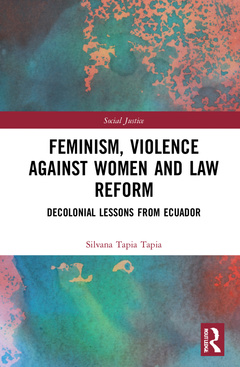Feminism, Violence Against Women, and Law Reform Decolonial Lessons from Ecuador Social Justice Series
Auteur : Tapia Tapia Silvana

Offering an important addition to existing critiques of governance feminism and carceral expansion based mainly on experiences from the Global North, this book critically addresses feminist law reform on violence against women, from a decolonial perspective.
Challenging the consensus that penal expansion is mainly associated with the co-option of feminist campaigns to counteract violence against women in the context of neoliberal globalisation, this book shows that long-standing colonial narratives underlie many of today?s dominant legal discourses justifying criminalisation, even in countries whose governments have called themselves "leftist" and "post-neoliberal". Mapping the history of law reform on violence against women in Ecuador, the book reveals how the conciliation between feminist campaigns and criminalisation strategies takes place through liberal legality, the language of human rights, and the discourse of constitutional guarantees, across the political spectrum. Whilst human rights make violence against women intelligible in mainstream legal terms, the book shows that the emergence of a "rights-based penality" produces a benign, formally innocuous criminal law, which can be presented as progressive, but in practice reproduces colonial and postcolonial paradigms that limit and reshape feminist demands. The book raises new questions on the complex social and political factors that impact on feminist law reform projects, as it demonstrates how colonial assumptions about gender, race, class, and the family remain embedded in liberal criminal law.
This theoretically and empirically informed analysis makes an innovative contribution to feminist legal theory, post-colonial studies, and criminal law; and will be of interest to activists, scholars and policymakers working at the intersections between gender equality, law, and violence in Latin America and beyond.
Introduction Toward a decolonial feminist critique of penality
Chapter 1 Protecting women in postcolonial Latin America
Chapter 2 Law was foe: women’s movements before the 1990s
Chapter 3 Violence against women, human rights, and the turn to criminal law
Chapter 4 From neoliberal to post-neoliberal: the constitutional journey of rights-based penality
Chapter 5 A new Penal Code: criminalising violence against women using rights-based penality
Chapter 6 Report from the field: women's experiences of using specialised penal courts
Conclusion
Silvana Tapia Tapia is Assistant Professor of Law at Universidad del Azuay (Ecuador). She holds a PhD in Socio-Legal Studies from the University of Kent (United Kingdom), a Master’s in Criminal Law, and a Bachelor’s in Law from the University of Azuay. In 2021 she was awarded a Leverhulme Early Career Scholarship to conduct research on violence against women and human rights penalty, hosted by the University of Birmingham.
Date de parution : 01-2024
15.6x23.4 cm
Date de parution : 04-2022
15.6x23.4 cm
Thèmes de Feminism, Violence Against Women, and Law Reform :
Mots-clés :
Vaw; Carceral Feminism; Human Rights; CEDAW; NGO Staff; Violated; Citizen's Revolution; Carceral Expansion; Penal Code; Liberal Legalism; Criminal Law; General Penal Code; Constitutional Criminal Law; Penal Expansion; UN; Penal Apparatus; Liberal Criminal Law; Sep; Indigenous Women; Criminal Law Reform; Women's Modesty; Law Reform; Indigenous Justice; Women’s Human Rights Discourses; Andean Cosmovision



